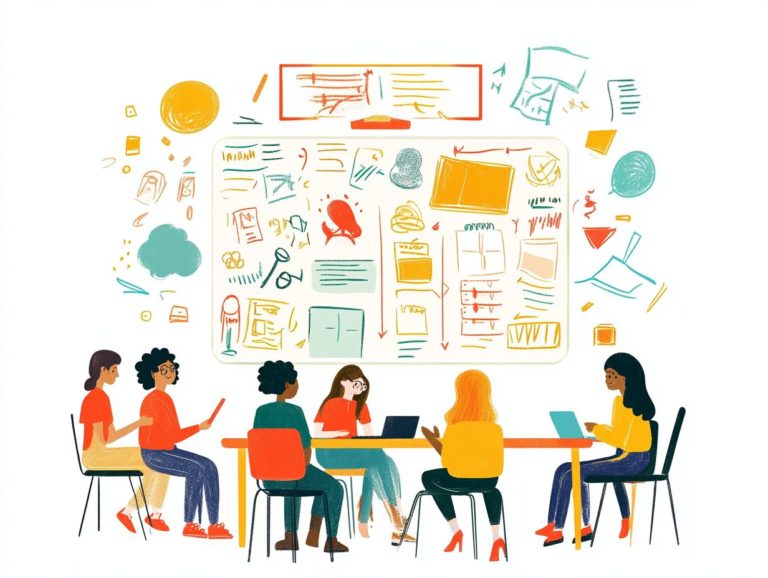the impact of culture on language learning techniques
Language learning transcends mere vocabulary and grammar memorization; it is intricately linked to culture.
Grasping the cultural nuances of a language enriches your communication and cultivates deeper connections.
This article delves into how culture influences your language-learning journey, exploring the myriad cultural factors that shape effective techniques.
From diverse communication styles to varying attitudes towards education, get ready to discover powerful strategies that will transform your learning!
We will also look at the pivotal role of language schools in helping you understand different cultures, ensuring that your language journey is both meaningful and successful.
Contents
- Key Takeaways:
- The Relationship between Culture and Language Learning
- How Culture Affects Language Learning
- Effective Language Learning Techniques in Different Cultures
- The Role of Language Schools in Addressing Cultural Differences
- Frequently Asked Questions
- What is the impact of culture on language learning techniques?
- How does culture influence the way we learn a language?
- What are some challenges that can arise when learning a language in a different culture?
- Can a person’s cultural background affect their preferred language learning techniques?
- How can understanding the impact of culture on language learning techniques benefit language learners?
- Are there any strategies that can help overcome the challenges of learning a language in a different culture?
Key Takeaways:
- The culture of a language can greatly impact the way it is learned, including communication styles, social norms, and attitudes towards language and education.
- To effectively learn a language in a different cultural context, it is important to adapt and utilize strategies tailored to that specific culture.
- Language schools play a crucial role in promoting cultural understanding and should incorporate cultural elements into their language learning curriculum.
The Relationship between Culture and Language Learning
The relationship between culture and language learning is incredibly impactful and shapes how we connect with others. Language functions not just as a means of communication but also as a rich vessel for cultural expression and identity.
By grasping cultural nuances like social norms and values you enhance your language acquisition and facilitate more effective communication.
Your language learning strategies are influenced by the cultural context, shaping the vocabulary you acquire and the expressions you use in different environments.
In today s increasingly globalized world, cultural exchange has become essential. It fosters cross-cultural communication and understanding, enabling you to navigate diverse linguistic landscapes with greater ease and confidence.
How Culture Influences Language Learning
Culture profoundly influences your language learning journey by shaping your understanding of social norms, expressions, and even gestures that are vital for effective communication, highlighting the role of cultural resources in language learning.
You are often guided by the cultural values that dictate how to interact with others, which can vary significantly from one region to another. For example, in some cultures, maintaining eye contact is a hallmark of confidence, while in others, it may be viewed as disrespectful.
Politeness strategies, like using indirect language or special words for showing respect, are essential for ensuring respectful exchanges. These cultural nuances enrich your learning experience and cultivate greater empathy and adaptability.
How Culture Affects Language Learning
Cultural factors significantly influence language learning techniques, highlighting the importance of cultural sensitivity in language learning, and affecting how educators engage with language acquisition across diverse educational contexts and communities.
Understanding these dynamics allows you to tailor your approach, ensuring that your methods resonate with the unique cultural backgrounds of your students.
This awareness enhances the learning experience and fosters a deeper connection between educators and learners.
Communication Styles and Social Norms
Communication styles shaped by social norms dictate how you express yourself and interact within various cultural contexts.
These styles can vary greatly, as what is deemed polite or assertive in one culture might be perceived as rude or overly aggressive in another.
For instance, some cultures favor indirect communication, where subtle hints and non-verbal cues convey intentions, while others embrace a more direct approach, valuing clarity and openness.
Understanding these variations is crucial not just for effective interaction but also for building relationships in diverse environments.
Mastering these nuances is essential for you as a language learner; recognizing the importance of gestures and tone can significantly enhance your comprehension and interpretation, ultimately bridging those communication gaps that can sometimes feel insurmountable.
Attitudes Towards Language and Education
Attitudes towards language and education are intricately woven into the fabric of cultural beliefs. This profoundly influences how you and your community value language learning and its significance in socialization.
In individualistic societies, you might find that language acquisition is celebrated as a personal triumph. This perspective encourages you to pursue your linguistic goals with independence and confidence, emphasizing individual expression and self-sufficiency.
Mastering a language is viewed as a gateway to personal opportunities and success.
On the flip side, in collectivist cultures, the emphasis often shifts to group harmony and communal identity. Here, language learning is cherished as a vital tool for fostering social cohesion and connection within the community.
In these contexts, the collective progress of the group frequently takes precedence over individual ambitions, showcasing the myriad ways cultural backgrounds shape attitudes toward language education.
Effective Language Learning Techniques in Different Cultures
Effective language learning techniques differ markedly across cultures. Understanding the impact of culture on language learning techniques is crucial, as various learning styles and cultural experiences shape how individuals acquire a second language, making it essential for you to consider these factors in your approach.
Adapting to Cultural Differences
Adapting to cultural differences is crucial for your language learning journey. It nurtures social harmony and elevates your social skills.
As you dive into a new language, you’ll encounter unique expressions and phrases that have meanings not obvious from the individual words, along with idioms and contextual references that are intricately woven into the fabric of specific cultures.
Recognizing these cultural nuances enhances your language acquisition. It also allows you to forge meaningful connections with native speakers.
Utilizing adaptive learning techniques such as role-playing, cultural workshops, and interactive discussions can deepen your understanding of these differences.
Embracing an open-minded attitude fosters a respectful exchange of ideas and traditions, enabling you to navigate social situations with finesse and sidestep potential misunderstandings.
Strategies for Success in Different Cultural Contexts
Success in language learning often depends on your ability to implement effective strategies that are tailored to various cultural contexts and linguistic environments.
By embracing techniques such as contextual vocabulary acquisition, you can significantly enhance your understanding of the language.
Imagine unlocking a whole new world of opportunities as you master a language tailored to its culture!
For instance, when you engage with native speakers through cultural exchanges, you not only learn commonly used expressions but also gain insights into the subtleties of idioms, which are often deeply rooted in cultural nuances.
Utilizing visual aids, like flashcards featuring local imagery, can create connections that make memory retention easier.
Understanding the cultural significance behind certain phrases or terms enriches your learning experience. This transforms language study into a journey that fosters meaningful connections across diverse cultural landscapes.
The Role of Language Schools in Addressing Cultural Differences
Language schools hold a crucial position in bridging cultural divides. They cultivate cultural awareness and sensitivity in both learners and educators.
Through their programs, they create an environment where appreciation for diverse perspectives thrives, enriching the overall educational experience.
Promoting Cultural Awareness and Sensitivity
Promoting cultural awareness and sensitivity is vital for cultivating an inclusive environment in your language learning journey. This enhances socialization and community building.
Language schools employ a myriad of methods to nurture this awareness among students like you. They seamlessly integrate lessons that delve into the intricacies of various cultures, providing opportunities to engage with authentic materials think literature, music, and cinema from diverse backgrounds.
Interactive workshops and community events allow you to immerse yourself in the local culture while honing your language skills.
By collaborating with cultural organizations and inviting guest speakers, these schools create a space for meaningful conversations that deepen your understanding.
This holistic approach not only elevates your fluency but also enables you to appreciate and navigate the rich social dynamics of multilingual environments.
Incorporating Cultural Elements into Language Learning
Adding cultural elements to your language learning journey enriches the experience. It connects language with cultural identity meaningfully.
Storytelling traditions offer insights into the language and the values that shape it. Idioms and proverbs reveal everyday life, capturing meanings often missed by vocabulary alone.
For example, understanding phrases in context deepens appreciation for cultural nuances. Engaging with these aspects expands vocabulary and builds empathy for speakers and their traditions.
Frequently Asked Questions
What is the impact of culture on language learning techniques?
Culture affects how we learn and use a language based on our background and experiences, highlighting the importance of cultural context in language teaching. Factors include cultural norms, beliefs, values, and communication styles.
How does culture influence the way we learn a language?
Cultural values shape our motivation and attitude towards learning. They also affect our learning and communication styles.
What are some challenges that can arise when learning a language in a different culture?
Learning a language in a new culture can be challenging. You may struggle with understanding cultural references, different communication styles, or unfamiliar customs.
Can a person’s cultural background affect their preferred language learning techniques?
Yes! A person’s cultural background influences their learning preferences. For instance, someone from a culture that values community may prefer group activities, while someone from a culture that values independence may lean towards self-study.
How can understanding the impact of culture on language learning techniques benefit language learners?
Understanding cultural impacts allows learners to adapt their strategies to fit their background. It also enhances communication with individuals from different cultures.
Are there any strategies that can help overcome the challenges of learning a language in a different culture?
Absolutely! Strategies include seeking cultural immersion, being open-minded and respectful towards new norms, and actively learning about the culture’s influence on language.





